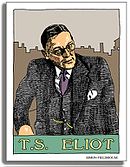Old Possum's Book of Practical Cats

Old Possum's Book of Practical Cats is a collection of whimsical poems by T. S. Eliot about feline psychology and sociology, published by Faber and Faber. It is the basis for the musical Cats.
The poems were written during the 1930s and included by Eliot, under his assumed name "Old Possum," in letters to his godchildren. Eliot, front flap. Larson. They were collected and published in 1939 with cover illustrations by the author, and quickly re-published in 1940, illustrated in full by Nicolas Bentley. It has also been published in reillustrated versions by Edward Gorey (1982) and Axel Scheffler (2009).
Contents
The contents of Old Possum's Book of Practical Cats, along with the name of the featured cat when appropriate, are:
- The Naming of Cats
- The Old Gumbie Cat (Jennyanydots)
- Growltiger's Last Stand
- The Rum Tum Tugger
- The Song of the Jellicles
- Mungojerrie and Rumpelteazer
- Old Deuteronomy
- Of The Awefull Battle Of The Pekes And The Pollicles Together With Some Account Of The Participation Of the Pugs and the Poms, And The Intervention Of The Great Rumpuscat
- Mr. Mistoffelees
- Macavity: The Mystery Cat
- Gus: The Theatre Cat
- Bustopher Jones: The Cat about Town
- Skimbleshanks: The Railway Cat
- The Ad-dressing of Cats
- Cat Morgan Introduces Himself (added in the 1952 edition)
Adaptations
In 1954 the English composer Alan Rawsthorne set six of the poems in a work for speaker and orchestra entitled Practical Cats, which was recorded soon after, with the actor Robert Donat as the speaker. At about the same time period another English composer, Humphrey Searle, composed another narrator piece based on the poems, using the flute, piccolo, cello and guitar. This work, Two Practical Cats, consisted of settings of the poems of Macavity and Growltiger.
Probably the best-known musical adaptation of the poems is the Andrew Lloyd Webber musical Cats. This musical premiered in London's West End in 1981 and on Broadway in 1982, and went on to become the longest-running Broadway show in history, until it was beaten by another Andrew Lloyd Webber show, The Phantom of the Opera.
As well as the poems in this volume, the musical introduces several additional characters from Eliot's unpublished drafts—most notably Grizabella.
Cultural references
In the film Logan's Run Logan and Jessica meet an old man in the Senate Chamber during their search for Sanctuary. The Old Man has many cats and refers to The Naming of Cats, explaining that each cat has three names: one common, one fancy, and one that only the cat knows. Later, the Old Man refers to one cat in particular. This cat is called "Gus," short for Asparagus.
Comparable work
On June 5, 2009, The Times revealed that in 1937 Eliot had composed a 34-line poem entitled "Cows" for the children of Frank Morley, a friend and a fellow director of the publishing company.[1] Morley's daughter, Susanna Smithson, uncovered the poem as part of the BBC Two's "Arena: T.S. Eliot" broadcast that night as part of the BBC Poetry Season.[2]
References
- T.S. Eliot (1982). Old Possum's Book of Practical Cats. Harcourt. ISBN 0-15-168656-4.
- Larsen, Janet Karsten (1982) "Eliot's Cats Come Out Tonight", Christian Century. May 5, 1982, p. 534.

